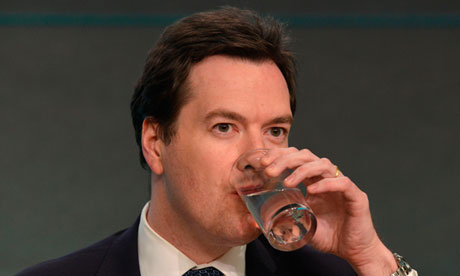 George Osborne is under mounting pressure to moderate his austerity strategy after the International Monetary Fund went public with fears that the pace of budget cuts is too severe for Britain's ailing economy.
George Osborne is under mounting pressure to moderate his austerity strategy after the International Monetary Fund went public with fears that the pace of budget cuts is too severe for Britain's ailing economy.The fund said it would be holding talks with the chancellor about his tax and spending plans in the wake of gloomy forecasts that subjected the UK to the biggest growth downgrade of any developed country for 2013 and 2014.
Olivier Blanchard, the IMF's chief economist, singled out Britain as a country that needed to adopt a less aggressive approach to deficit reduction.
Speaking at the release of the fund's half-yearly World Economic Outlook (WEO), Blanchard said: "In the face of very weak private demand, it may be time to consider adjustment to the original fiscal plans."
The call came after the IMF shaved 0.3 points off both its 2013 and 2014 growth forecasts for the UK, saying it now expected the economy to expand by 0.7% this year and by 1.5% in 2014.
Until now, the IMF has hinted that the government might need to reassess its approach but stopped short of telling Osborne to change course. The tougher line now being adopted presents a political headache for the chancellor, who until now has been able to rely on international support for his policies.
Ed Balls, the shadow chancellor, said: "It was a serious mistake for George Osborne to totally ignore the IMF's calls for a reassessment of fiscal policy in the budget. They are right to step up their warnings and insist that a change of economic policy is considered right now.
"Our economy has flatlined for two and a half years, real wages are falling month by month and the result is £245bn more borrowing than planned to pay for this economic failure. How much more damage needs to be done before the chancellor finally acts?"
A Treasury spokesman said: "Today's report from the IMF highlights the risks that continue to face economies around the world. Though the UK is forecast to have stronger growth than either France or Germany in 2013, difficulties in the euro area are still creating economic headwinds."
Privately, Treasury sources sought to play down the significance of the IMF's warning, saying that a power struggle was going on within the Washington-based institution between deficit hawks and those, like Blanchard, favouring a slower pace of adjustment. They added that America's deficit reduction in 2013 would be far more rapid than Britain's.
Eagerly awaited growth figures for the UK are due out next week but regardless of whether they show Britain in an unprecedented triple-dip recession, the IMF said recovery was progressing slowly, constrained by the weakness of trade and attempts to reduce the government's budget deficit.
"Domestic rebalancing from the public to the private sector is being held back by deleveraging, tight credit conditions and economic uncertainty, while declining productivity growth and high unit labour costs are holding back much-needed external rebalancing," the WEO said.
For the world economy as a whole, the fund marginally cut its 2013 growth forecast by 0.2 percentage points to 3.3%, but said its prediction of an acceleration to 4% in 2014 remained unchanged.
It said growth continued to be powered by emerging markets, with the developed world continuing to struggle. Blanchard said that within the developed world there was a contrast between the United States, expected to grow by 1.9% in 2013 and 3% in 2014, and the eurozone – which will contract this year and experience only 1.1% expansion in 2014.
"Recent good news about the United States has come with renewed worries about the euro area. Given the strong interconnections between countries, an uneven recovery is also a dangerous one," Blanchard said. He noted that some risks to the global economy, such as the US falling off the fiscal cliff or a breakup of the euro, had diminished, but that it was "not time for policymakers to relax".
The fund said some central banks – including the Bank of England— would find it difficult to remove the huge stimulus provided over the past four years, warning that some could face "significant trade-offs" between fighting inflation and preventing a tightening of policy leading to fresh outbreaks of financial instability.
It also sounded a note of caution about the Bank of England's funding for lending scheme (FLS), which provides a subsidy to commercial banks in order to encourage them to lend. "Although it is still early days, so far the FLS's impact has been limited, encouraging mortgage lending more than lending to small and medium-size businesses."
Original Article
Source: guardian.co.uk
Author: Larry Elliott
No comments:
Post a Comment